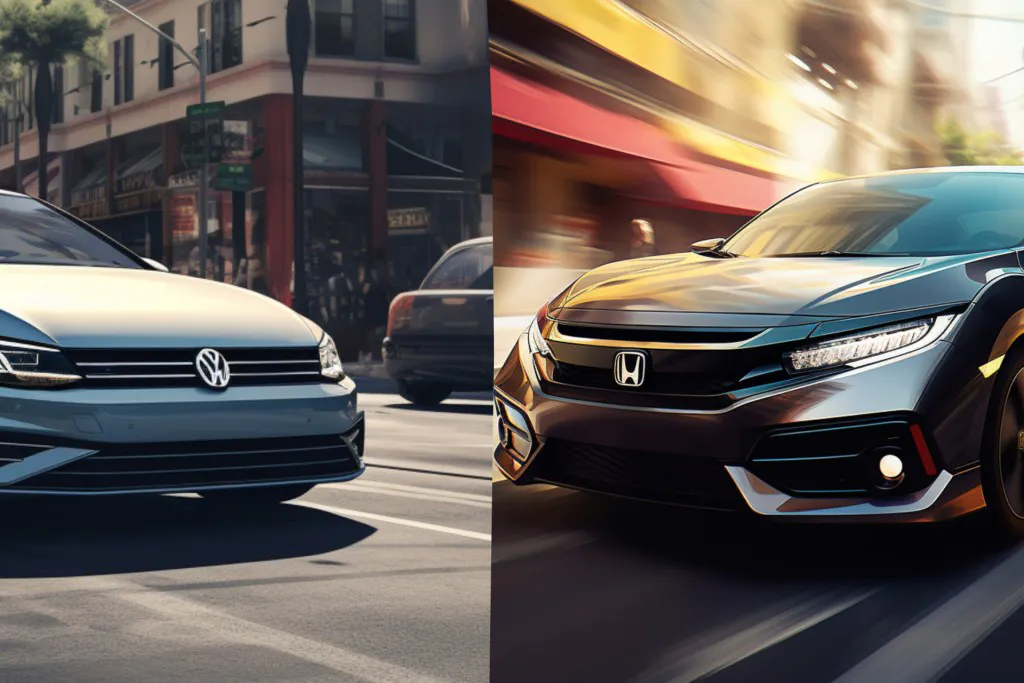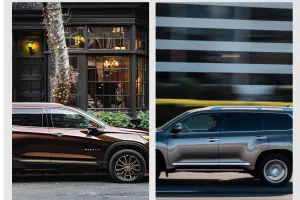While American automakers have abandoned the entry-level passenger car market, mainstream imports are happy to pick up the slack. Among these offerings are the Volkswagen Jetta and Honda Civic.
The Jetta and Civic have much in common, including similar sizes and prices. They are true head-to-head competitors, especially in lower-trim sedan form. This is no less the case with the 2023 model year. In addition, the Jetta and Civic are the entry points into their respective brands. Want the cheapest VW or Honda? Then you’re looking at a Jetta or Civic.
Although I’ve never owned either of these cars, I’ve owned other Volkswagens and Hondas over the years, giving me an understanding of both automakers. A Volkswagen is for the contrarian—someone who doesn’t always follow the crowd and prefers their car to be more unique. Most VWs have more engaging driving characteristics than you’d find in Toyota. Call it German engineering or European flair, even if the Jetta is made in Mexico.
On the other hand, a Honda is for someone who prefers to trade some of the distinctiveness for greater predictability. This isn’t to say Hondas are boring, but their behind-the-wheel attributes are definitely different from VW; not better or worse, just different. Compared to the Toyota Corolla, however, a Honda Civic is a driver’s car, just not at the level of a Jetta (excluding the performance-tuned Civic Type R).
Comparing the 2023 editions of the Jetta and Civic opened my eyes to a few things. In particular, I came away impressed with what buyers get with the base Jetta S. For a little over $20,000, the car has a lot of features, including advanced safety tech that isn’t even optional on the comparable Civic. While long-term ownership costs are greater for the Jetta than the Civic, the difference isn’t as great as expected.
The Civic’s strengths include its extra cabin space and the availability of a hatchback body style. I’m a fan of five-door passenger cars because they do a nice job of combining sedan convenience and crossover versatility. Honda also gets bonus points for offering an upgraded Civic engine that doesn’t require spending more than $30,000. A more powerful Jetta is above this threshold.
Keep reading as I explore what you need to know to compare the 2023 versions of the Volkswagen Jetta and Honda Civic. I’ll cover prices, powertrain specifications, ownership costs, safety details, key features, and warranty information.
Curious about used car options? Learn more about the best and worst years of the Volkswagen Jetta and Honda Civic, plus the Honda Accord, Nissan Altima, Nissan Sentra, Toyota Camry, and Toyota Corolla.
Not looking to buy the latest model? Check out our budget-friendly article.
Learn more about the methodology used for this article.
2023 Volkswagen Jetta Vs. Honda Civic | A Guide to Trim Levels & Optional Features
Trim Levels: Starting Prices
Quick Take: The Jetta wins the price war, particularly with entry-level trims.
On the surface, the Jetta S trim’s $20,655 starting price appears to be a bargain. However, you’ll need to add another $800 for an automatic transmission to make a true apples-to-apples comparison against the Civic Sedan LX, which stickers at $23,750. Nonetheless, there’s still $2,295 still separating these base editions. Put another way, the entry-level Jetta is 10% cheaper than the equivalent Civic. That’s a substantial difference for cars in this market segment.
This gap increases to almost $3,000 when moving up the range to the Jetta Sport ($22,355 with the automatic gearbox) and the Civic Sedan Sport ($25,350). Meanwhile, the Jetta SE ($24,385) and Civic EX ($26,200) sit in the middle of their respective model lineups, offering more upscale goodies. Add in $850 for a sunroof (standard on the Civic EX); less than $1,000 separates these versions. Price becomes less of a differentiator when comparing these mid-tier offerings.
Do you prefer leather and other upscale extras with your entry-level sedan? Then, you’ll have to decide if spending an extra $1,965 for the Civic Touring ($30,350) over the Jetta SEL ($28,385) is worth it. The sporty versions of these cars (the Jetta GLI at $31,585 and the Civic Si at $28,000) don’t quite align. Both vehicles get extra horsepower, but the GLI gets more luxury treatments (like leather upholstery), while the Si retains more purist vibes.
From here, the respective model range diverges. Honda offers the Civic in multiple hatchback variants. Like the Civic sedan, there’s the base LX and more premium offerings, but the hatchback costs more than the equivalent sedan. However, if you want five-door convenience with a VW badge, you’ll have to move to the Golf, which only comes in performance editions (the GTI and the R) for 2023. Because the Golf is a distinct model, it’s not included in this comparison.
| 2023 Volkswagen Jetta Model | Starting Price |
| S* | $20,655 |
| Sport* | $21,555 |
| SE | $24,385 |
| SEL | $28,385 |
| GLI Autobahn* | $31,585 |
| 2023 Honda Civic Model | Starting Price |
| Sedan LX | $23,750 |
| Sedan Sport | $25,350 |
| Sedan EX | $26,200 |
| Sedan Touring | $30,350 |
| Hatchback LX | $24,750 |
| Hatchback Sport | $26,150 |
| Hatchback EX-L | $27,900 |
| Hatchback Sport Touring | $31,250 |
| Si Sedan* | $28,000 |
| Type R* | $43,795 |
Cost of Ownership
Quick Take: The Civic proves cheaper to own over time, but not by much.
While the purchase price is crucial in buying a new car, ownership costs should also be considered. Edmunds breaks down what this looks like for the 2023 Volkswagen Jetta and Honda Civic.
Based on the least expensive trims, Edmunds forecasts a five-year ownership cost of $33,630 for the Jetta(S 4dr Sedan) and $33,392 for the Civic(LX 4dr Sedan). That’s $238 more to own a Jetta.
Several elements go into this calculation: depreciation, financing, insurance, fuel, taxes/fees, and maintenance/repairs. On a per-mile basis, the average ownership cost is $0.45 for the Jetta and $0.42. These projections are based on 15,000 miles per year.
| 5-Year Ownership Cost | ||
| Costs | Volkswagen Jetta | Honda Civic |
| Cost to Own | $33,630.00 | $33,392.00 |
| Average Cost Per Mile | $0.45 | $0.42 |
| Depreciation | $9,946 | $7,975 |
| Fuel | $7,984 | $7,767 |
| Maintenance | $3,488 | $3,261 |
| Repairs | $1,006 | $665 |
2023 | Volkswagen Jetta Vs. Honda Civic | Specifications | Safety, Interior, and Exterior Features
Sizing up the Volkswagen Jetta and Honda Civic involves a look at each vehicle’s specifications. Here’s what you need to know.
Vehicle Class & Body Style:
Quick Take: While the Jetta and Civic come as sedans, the Honda has a hatchback option.
The U.S. Environmental Protection Agency (EPA) classifies the Jetta and Civic as mid-size sedans based on passenger volume. The Honda Sedan has as much as 99.0 cubic feet inside, compared to a maximum of 94.7 cubic feet for the Jetta. Most Civic Hatchbacks have 96.6 cubic feet of passenger volume, splitting the difference between the Jetta and the Civic Sedan.
Overall, a few cubic feet may not make much of a difference, but it gives the Civic the upper hand in passenger space, which I’ll detail later.
| 2023 Volkswagen Jetta | 2023 Honda Civic | |
| Class | Mid-size Sedan | Mid-Size Sedan |
| 4-Door Sedan |
S,Sport,SE, SEL, GLI Autobahn |
Civic Sedan (LX, Sport, EX, Touring), Si Sedan |
| 4-Door Hatchback |
N/A | Civic Hatchback (LX, Sport, EX-L, Sport Touring), Type R |
Powertrain:
Quick Take: Volkswagen offers zippier acceleration with the Jetta, while Honda gains an edge with better fuel economy. Both automakers keep the manual transmission alive and well.
Engine Options & Specifications:
I’ll give VW and Honda credit for employing a one-size-fits-all approach to engines in their entry-level cars. Both vehicles have perfectly adequate base powerplants, but more potent options are available.
Volkswagen does more with less with the Jetta’s standard turbocharged 1.5-liter four-cylinder engine. 158 horsepower won’t win many races, but a 0-60 mph acceleration of 7.7 seconds is almost quick.
Coincidently, the Civic’s base engine also delivers 158 horsepower, but this comes from a 2.0-liter four-cylinder engine without the benefit of turbocharging. To put it kindly, a 0-60 time of 8.8 seconds is pokey. Its modest performance won’t matter much in urban and suburban driving but may feel inadequate during highway outings.
Moving to a next-step engine changes the performance picture. Only available with the Jetta GLI, Volkswagen’s turbo 2.0-liter four-cylinder dials up output to a punchy 228 horsepower. This VW reaches 60 mph from a standstill in 7.1 seconds, not blazing fast, but enough to push you back in your seat.
Honda’s methodology with engine upgrades starts with a turbocharged 1.5-liter four-cylinder, making 180 horsepower. Standard on higher Civic trims, this powerplant cuts acceleration time by 1.3 seconds. A 0-60 dash of 7.5 seconds is a noticeable improvement. Still, the Civic Si gets even more of a boost (to 200 horsepower), reducing acceleration to 7.2 seconds, almost equal to the Jetta GLI.
The 315-horsepower coming from the Civic Type R’s mighty turbo 2.0-liter engine has no equal in the Jetta realm; that’s what the VW Golf R is for.
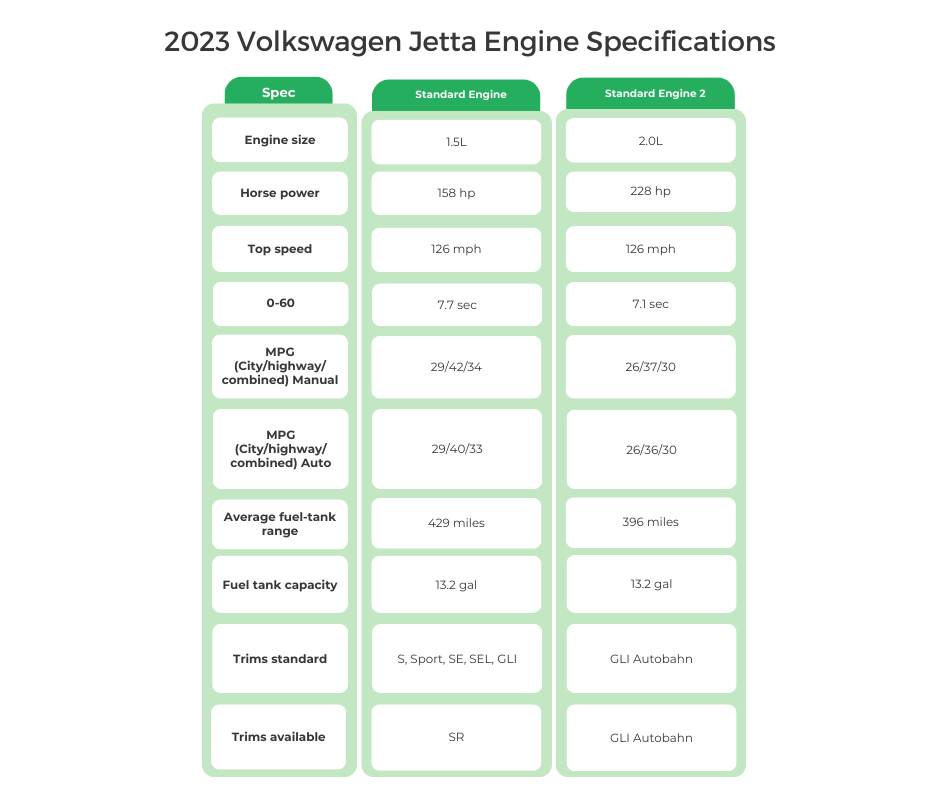
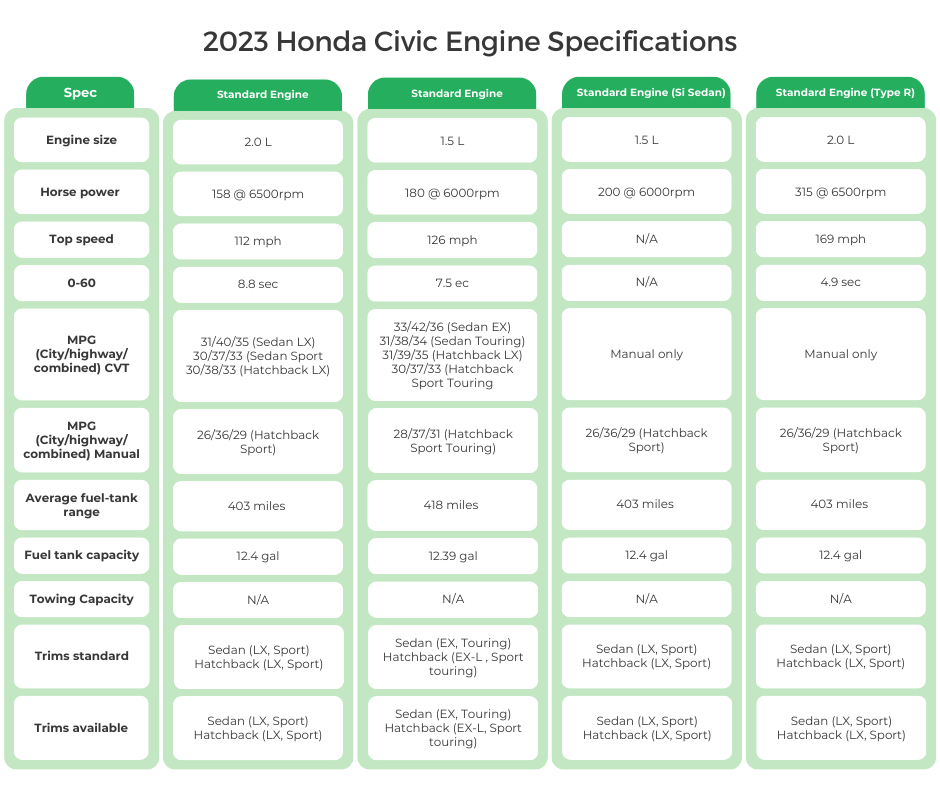
Fuel Economy:
A conversation about fuel economy is necessary when looking at the Jetta and Civic. It’s safe to say that buyers of these cars may not have the deepest pockets, so saving money at the pump is vital.
Fuel economy with the base engines is basically a toss-up. A base Jetta with an automatic is rated at 29 mpg in the city and 40 mpg on the highway. A Civic Sedan LX comes in with 31 city/40 highway.
However, the Civic pulls ahead with the premium (non-performance) engine in the higher trims. For example, the Civic Sedan EX gets 33 city/42 highway. In comparison, the Jetta GLI with a manual gearbox delivers an estimated 26 city/37 highway. Its Civic equal, the Si, is almost the same with 27 city/37 highway.
All in all, there’s not much gas savings to be had by choosing a base Civic over a base Jetta (or the So over the GLI). But fuel economy gets marginally better with a Civic with the 180-horsepower turbo 1.5-liter engine.
Transmission Options & Specifications:
As somewhat of an automotive purist, I find it refreshing to still talk about a manual transmission, an option with the Jetta and Civic. Yet, each manufacturer employs a slightly different strategy.
For VW, a DIY gearbox keeps the MSRP lower for its cheaper Jetta editions. It also offers this transmission with the GLI, making the top-tier trim more of a driver’s car. In contrast, Honda offers a manual transmission in the guise of performance. It’s only available with Civic Hatchbacks with “Sport” in the trim name and is the sole gearbox for the Si and Type R. Interestingly, there’s no price difference for a manual or automatic on the models where this is a transmission choice.
Volkswagen and Honda head in separate directions with their self-shifting transmissions. The German automaker sticks with conventional automatic gearboxes (7- or 8-speed), while Honda relies solely on a continuously variable transmission (CVT). A CVT skips individual gears for a belt system that adjusts to balance and fuel economy.
Arguably, Honda makes one of the better CVTs on the market, but it’s engineered with a bias towards saving gas. The average driver won’t know the difference between a traditional automatic transmission and a CVT, but those more sensitive to gear shifts will be able to tell.
See the “Tech Talk” section below the charts to learn about CVTs.
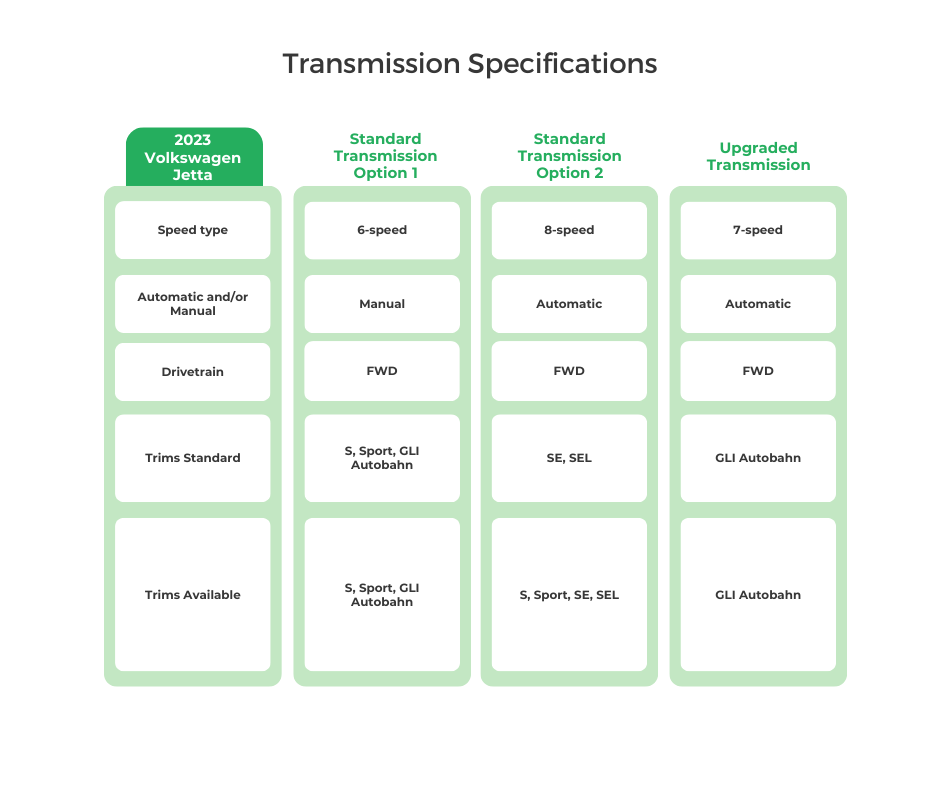
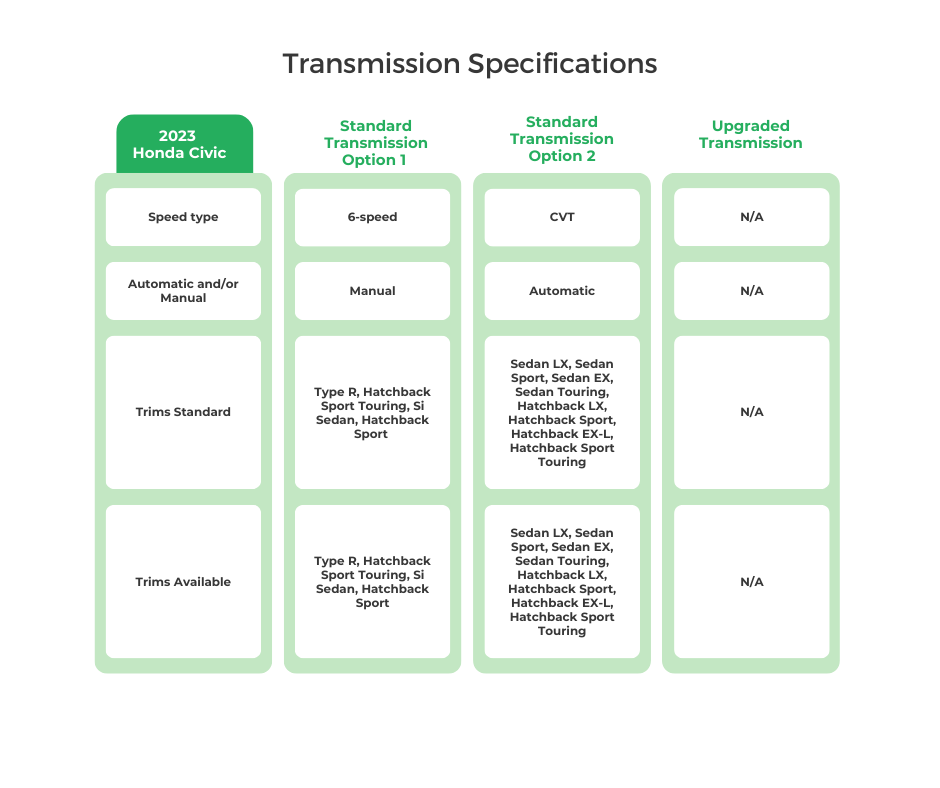
TECH TALK: CVTs
A continuously variable transmission (CVT) does not use gears like a typical automatic transmission. Instead, it has two pulleys connected by a belt. One pulley connects to the engine, and the other connects to the wheels. The belt transfers the power between the pulleys. This setup allows the pulleys to continuously change positions as needed. The CVT automatically adjusts the pulleys as required, providing smooth and efficient power delivery.
Drivetrain:
There’s not much to discuss regarding drivetrains for the Jetta and Civic. Both are strictly front-wheel-drive automobiles. You’ll have to look at the Toyota Corolla or Mazda Mazda3 if you want an entry-level car with all-wheel drive.
|
2023 Volkswagen Jetta Wheel Drive |
FWD | AWD | RWD |
| S | S | ||
| Sport | S | ||
| SE | S | ||
| SEL | S | ||
| GLI Autobahn | S |
| 2023 Honda Civic Standard | FWD | AWD | RWD |
| Sedan LX | S | ||
| Sedan Sport | S | ||
| Sedan EX | S | ||
| Sedan Touring | S | ||
| Hatchback LX | S | ||
| Hatchback Sport | S | ||
| Hatchback EX-L | S | ||
| Hatchback Sport Touring | S | ||
| Si Sedan | S | ||
| Type R | S |
Safety:
Quick Take: The Jetta and Civic are evenly matched in NHTSA testing, but the newer Jetta gets the nod from IIHS.
NHTSA Safety Ratings
Crash test performance is a crucial consideration with any vehicle purchase, especially with modestly sized cars like the Jetta and Civic. While larger vehicles have the benefit of extra bulk to isolate occupants, smaller sedans and hatchbacks must rely on more sophisticated engineering for better crash energy management.
The Jetta and Civic get a praiseworthy five-star overall rating in tests conducted by the National Highway Traffic Safety Administration (NHTSA). This is as good as it gets. There are identical results for the side impact assessment. However, both vehicles take a slight step back in the front crash test, receiving a still-admirable four-star ranking.
The Jetta falls behind the Civic in the government’s rollover assessment. A four-star rating for the Jetta is typical of most vehicles, but the Civic heads to the top of the class with a five-star performance. Government data shows that rollovers account for only 2% of all crashes, reducing the significance of the Civic’s advantage. 
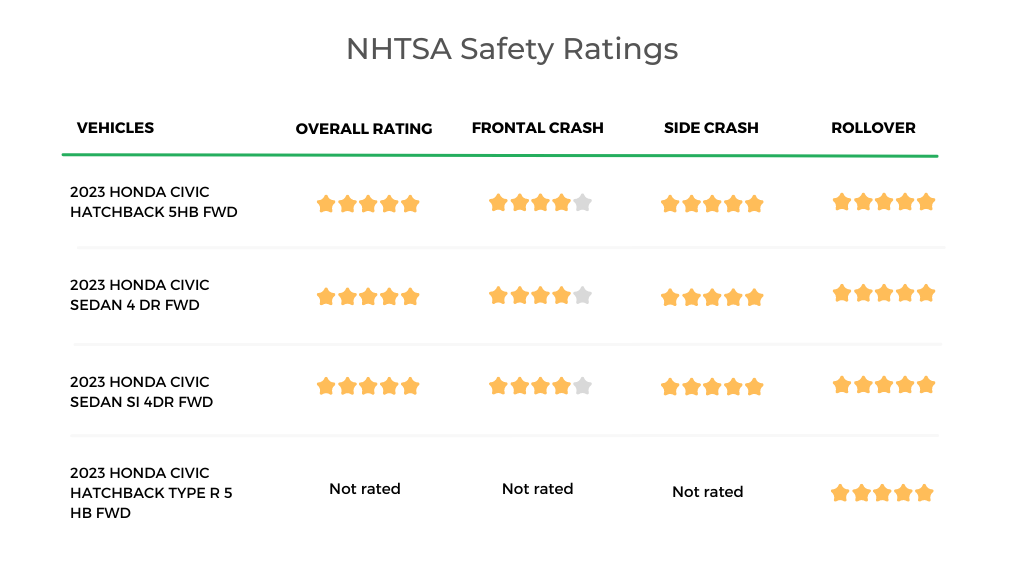
IIHS Awards:
The Insurance Institute for Highway Safety (IIHS) takes a somewhat different approach to safety testing. In particular, it focuses on its small frontal overlap crash test, which the organization feels represents a more real-world scenario (a single car running into a fixed object). IIHS also looks at side impact crashes, roof strength, headlight effectiveness, and advanced driver safety technologies (like automatic emergency braking).
While tested vehicles receive a Good, Acceptable, Marginal, or Poor grade, the true measure comes if a car gets a Top Safety Pick or Top Safety Pick+ designation. If “Good” is a “B” grade, Top Safety Pick notches things up to an “A-,” and the Top Safety Pick+ signifies an “A+.”
The Civic received Top Safety Pick designations, while the Jetta came up short with no above-average accomplishments. This Volkswagen has been around since the 2019 model year and is due for a more advanced generation. Meanwhile, 2022 marked the debut of the eleventh-generation Civic.
| IIHS Award | Tested Vehicle | ||
| 2023 Volkswagen Jetta |
MIDSIZE CAR/ 4-DOOR SEDAN |
None | 2019 Volkswagen Jetta 1.4T SEL Premium 4-door |
| 2023 Volkswagen Jetta 1.5T S 4-door |
|||
| 2023 Honda Civic |
SMALL CAR / 4-DOOR SEDAN |
2023 TOP SAFETY PICK |
2022 Honda Civic 1.5T Touring 4-door |
| SMALL CAR / 4-DOOR HATCHBACK |
2023 TOP SAFETY PICK |
2022 Honda Civic 1.5T Touring 4-door |
|
Airbags & Head Restraints:
The Jetta and Civic have their share of airbags. Both are equipped with front and side airbags for the front row and side curtain units that protect the head in an accident or rollover. However, the Civic again has an edge due to airbag placement beyond what the Jetta offers.
In particular, the Civic has a knee airbag for each front-row position, helping to better position the body during a collision to minimize injuries. The Jetta lacks this feature. Further, the rear outboard positions in the Civic are protected by side impact airbags. Again, technology that doesn’t exist in the Jetta. Interestingly, Volkswagen’s luxury division, Audi, was one of the first automakers to offer rear seat side airbags.
Neither the Jetta nor the Civic comes with overhead airbags. This newer technology replaces traditional front-row units (steering wheel and dashboard) with overhead devices. Active head restraints are usually found in specialty and high-end vehicles to minimize whiplash injuries. Mainstream cars like the Jetta and Civic aren’t usually equipped with this feature.
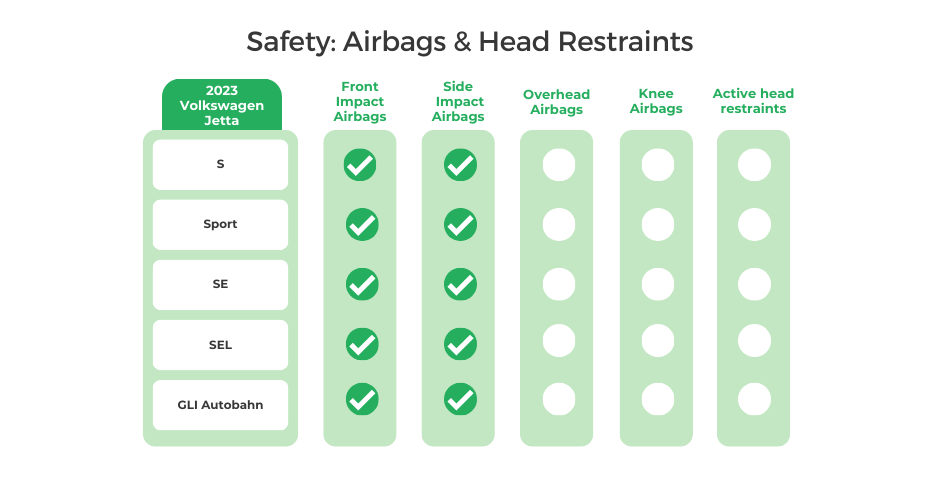
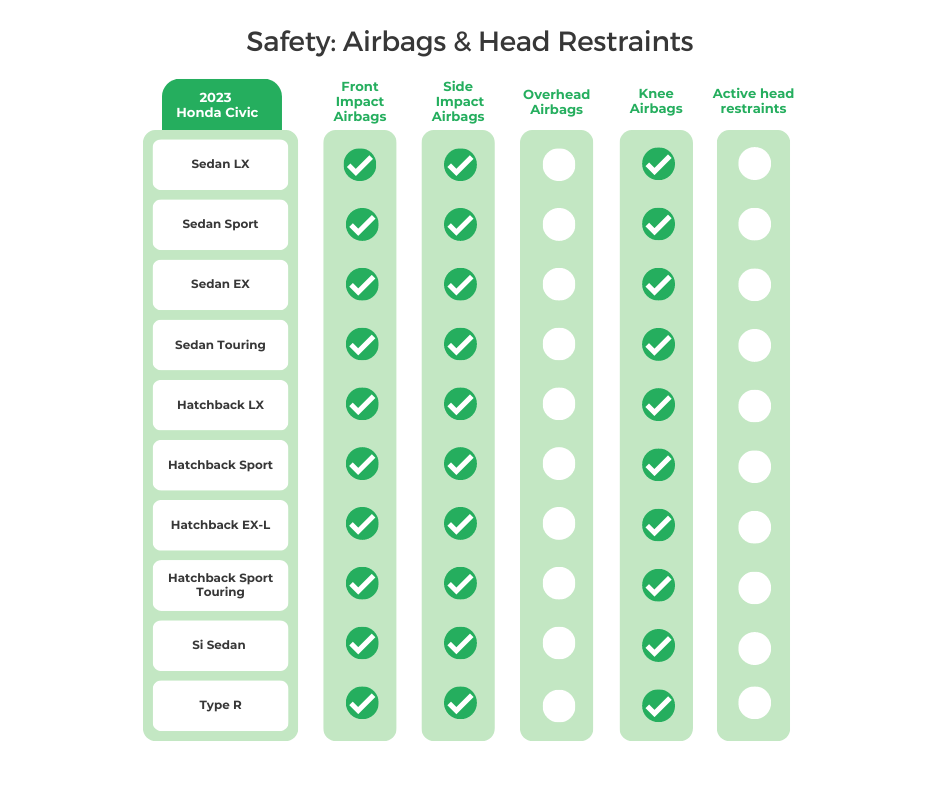
Driver-Focused Features and Equipment:
Quick Take: Honda makes adaptive cruise control standard across the board with the Civic, while Volkswagen does the same with blind-spot monitoring and rear cross-traffic alert in the Jetta.
Semi-Autonomous Driving:
Hands-free driving technology isn’t something you’ll find in price-focused cars like the Jetta and Civic. Instead, drivers will encounter semi-autonomous driving features as optional or standard equipment. Remember earlier when I mentioned that the lower Jetta trims were substantially cheaper than their Civic counterparts? Now you’ll know why.
Adaptive cruise control (ACC) is standard across the Civic line, while it’s an add-on for the Jetta S and Sport. ACC is a driver-assist technology that automatically adjusts the vehicle’s speed to maintain a safe distance from cars in front. Similarly, lane-keeping support is optional with the Jetta trims but standard on more expensive versions and all Civics.
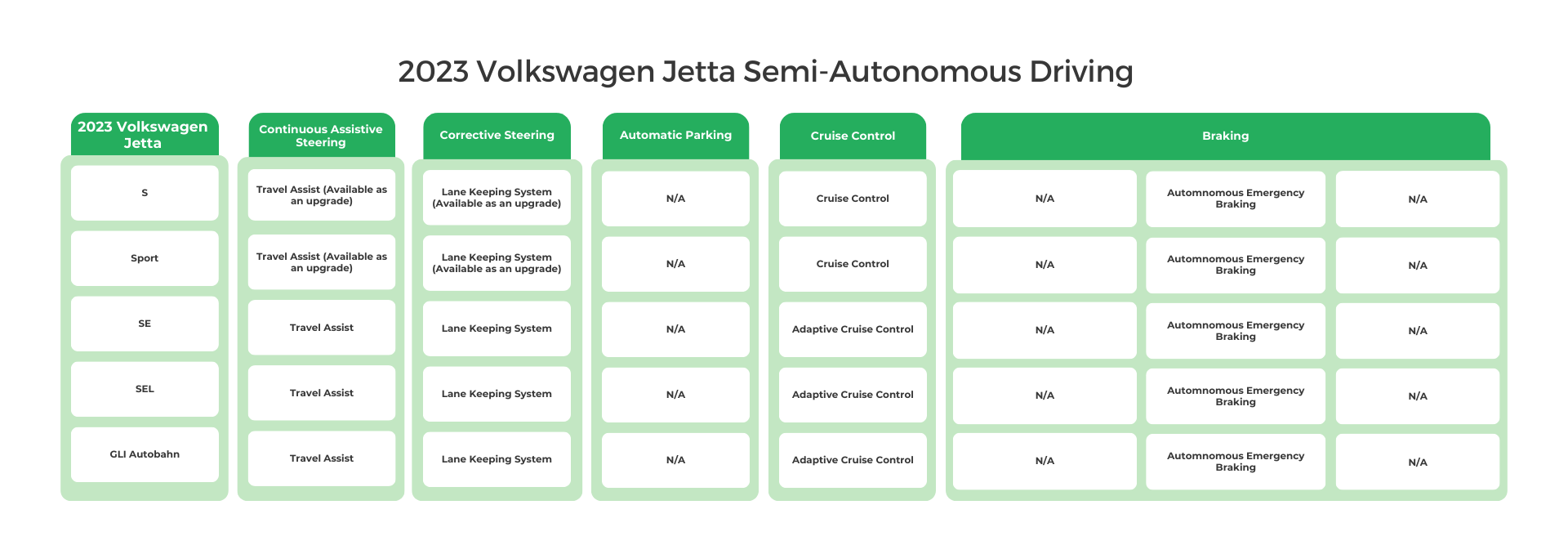
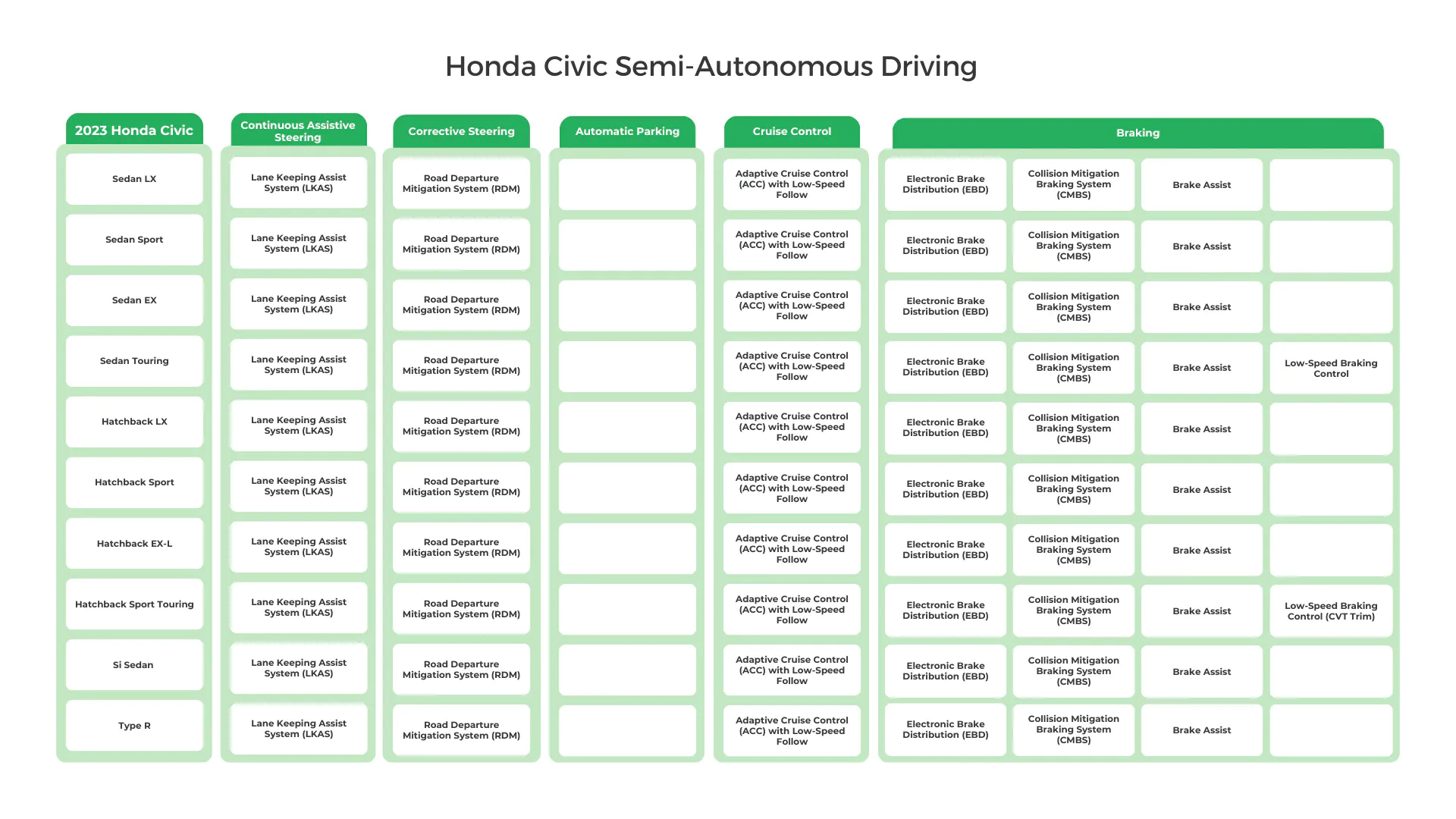
Driver Warning Systems & Telematics:
The safety technology advantage shifts to the Jetta when assessing advanced driver assistance systems (ADAS). Both cars have forward collision warning (FCW) and automatic emergency braking (AEB) with pedestrian detection.
However, all Jetta trims get blind-spot monitoring (BSM) and rear cross-traffic alert (RCTA), while these features aren’t available at any price on lower Civic trims and are an option on mid-tier editions. Anyone who’s ever had a blind spot close call (or worse) knows the value of this technology.
All Civics get lane departure warning (LDW), an option on lower-priced Jettas, and traffic sign recognition (not available on the Jetta). But, if I had to choose, I’d select BSM/RCTA over LDW any day of the week.
Both manufacturers offer telematics (marketed as VW Car-Net or HondaLink) for emergency support, remote vehicle services, and other features. However, Volkswagen offers this technology on all Jettas, while available only with upper-end Civics.
If ADAS technology appears like alphabet soup, check out an effort from AAA, Consumer Reports, J.D. Power, and other groups working to standardize the terminology for these systems.


Road Visibility Features:
Seeing LED headlights on a $21,000 Jetta is impressive. It’s not the most expensive equipment, but other automakers usually provide less-effective halogen headlights on their base trims at this price point. That said, I’m surprised that automatic headlights only come with the pricier Jettas; this feature is standard on most new cars, including the Civic.
Meanwhile, only two Civics (top-end editions) have rain-sensing windshield wipers, compared to it being standard or optional across the Jetta range. Rain-sensing wipers may not be the most crucial feature, but it can matter if you deal with a rainy climate or season. All Jettas and Civics have a rearview monitor, a federal requirement.
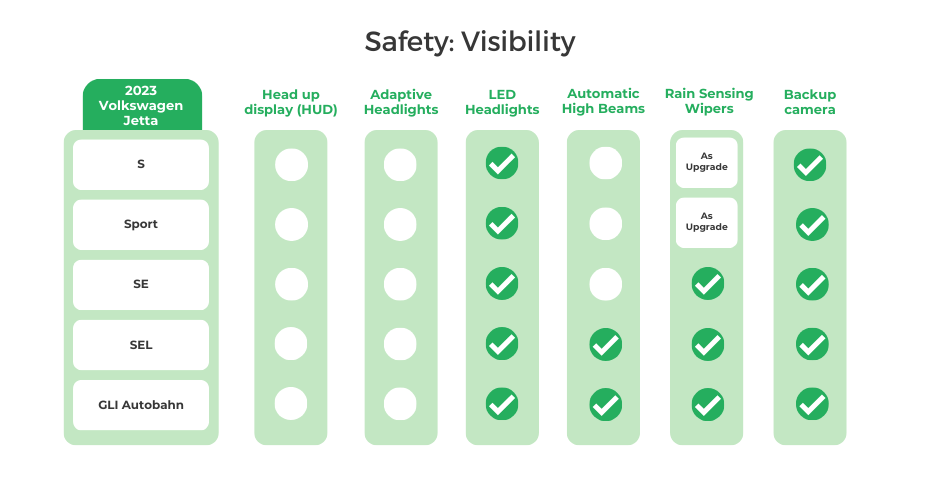
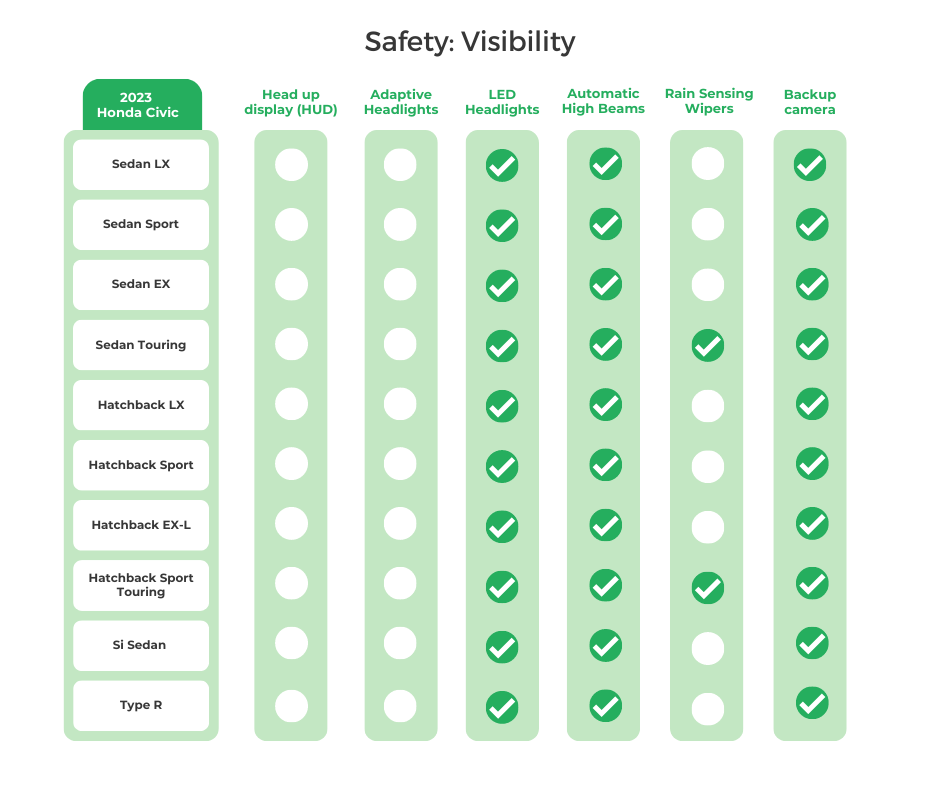
Interior:
Quick Take: There are no worries about syncing a smartphone to a Jetta or Civic, but getting heated seats can be hot or miss. Civic passengers get more room, while the Civic Hatchback is the cargo champion.
Interior Features:
To the credit of their respective manufacturers, all Jetta and Civic trims come standard with Apple CarPlay and Android Auto. This feature is necessary for cell phone-dependent buyers (meaning everyone).
A shopper with heated front seats on their deal-breaker list will have to work a little harder to get this feature. In other words, buy a Jetta SE, SEL, or GLI. Or, choose a Civic Sedan EX or Touring or a Civic Hatchback EX-L.
And speaking of heated seats, some automakers offer this feature through a subscription service. This hasn’t yet happened in the U.S., but in certain countries, BMW offered heated seats for a monthly fee. The advantage is you can shut off the service during warm months, but you’ll need to keep paying (or pay a one-time upfront fee) to activate the heated seats. Recently, BMW announced it was backing away from this practice. Moving forward, the automaker will only charge a subscription for software-based services (like upgraded navigation). Hardware-based features will be part of the vehicle’s initial purchase price.
One industry study shows mixed results for consumer acceptance of features on demand (FoD), with about one-fifth not even being aware of the concept.
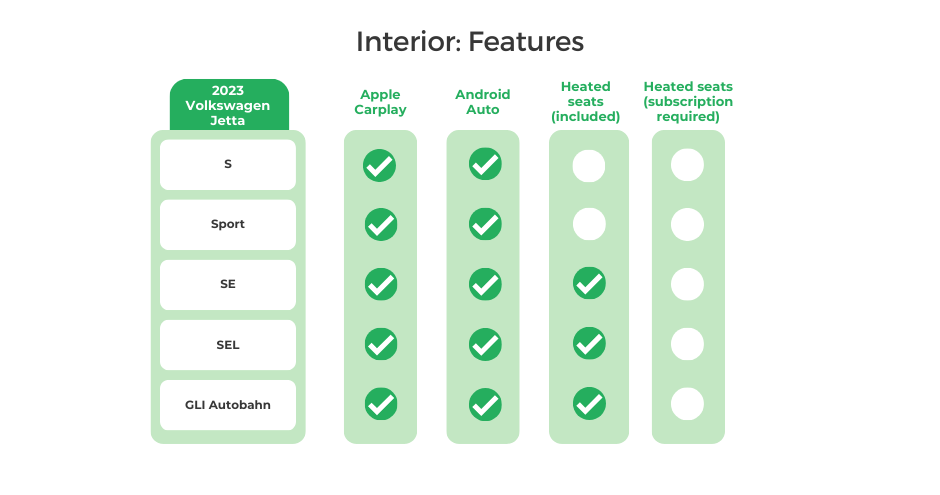
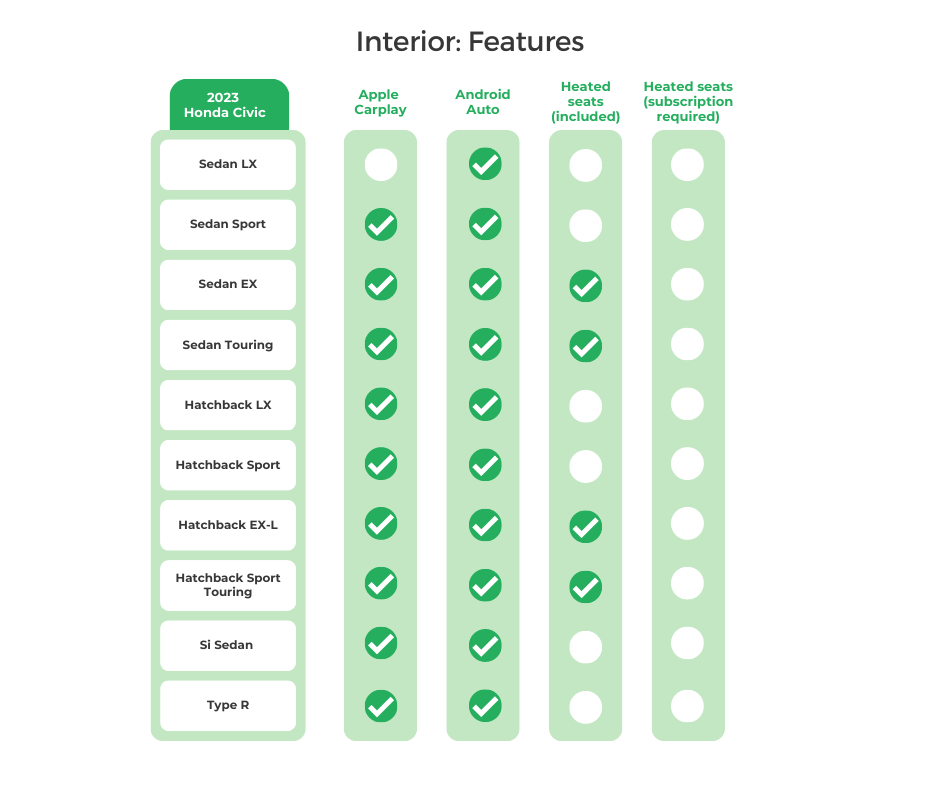
Interior Dimensions:
There are a couple of interior measurements (rear legroom and headroom, for example) where the Jetta and Civic are evenly matched. Otherwise, the Civic’s extra passenger volume creates extra space in both rows.
In particular, the Civic’s 42.3 inches of front legroom offers a noticeable difference over the 41.1 inches in the Jetta. This Honda also excels with two inches more front and rear shoulder room. There’s also more front hip room. On the other hand, the Jetta has better rear hip room.
If cargo space is a priority, the Civic Sedan’s 14.8 cubic feet won’t provide much more capacity than the 14.1 cubic feet in the Jetta. However, the Civic Hatchback’s 24.5 cubic feet of rear storage is certainly generous.

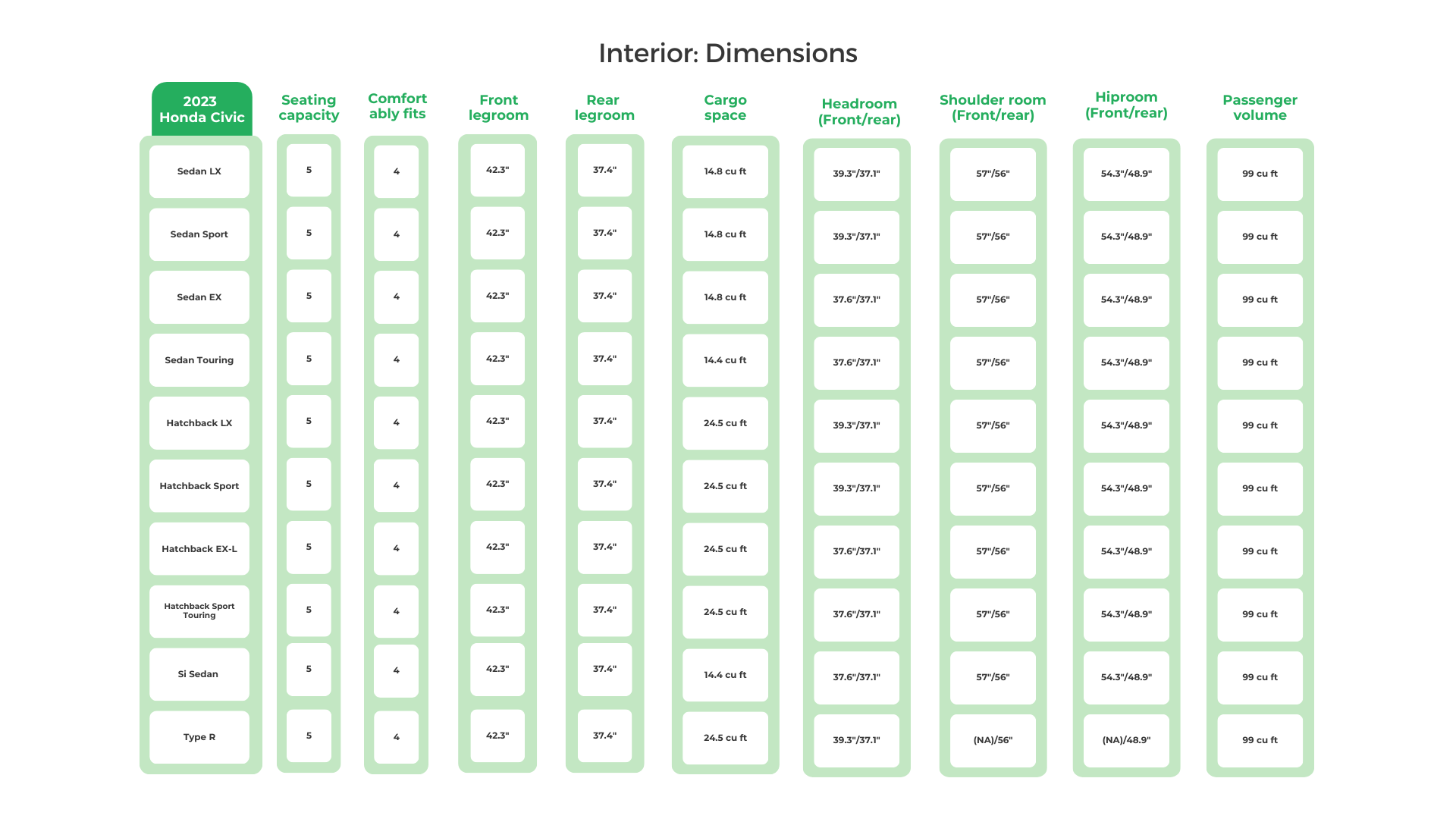
Exterior:
Quick Take: Exterior shades for the Jetta and Civic are the usual collection of monotones with the occasional splash of color. Despite a smaller interior, the Jetta is larger on the outside.
Exterior Features:
Wheels may also be an afterthought for many car buyers. But wheel size can impact ride quality. Larger rims can translate into better traction and cornering but may result in a bumpier ride. Bigger wheels also offer better aesthetics by filling out the wheel wells more completely. This is why the higher the trim, the larger the wheel. Different materials (steel or alloy) and finishes also help separate the wheels among the various trim levels.
Don’t expect a Jetta to be available with any wild colors; red or blue is as exciting as it gets. Of course, there are options for black, white, gray, and silver. The choices are similar with the Civic, although Rallye Red and Aegean Blue Metallic are a bit punchier. The true standout is a Civic Type R ordered in can’t-miss Boost Blue Pearl.
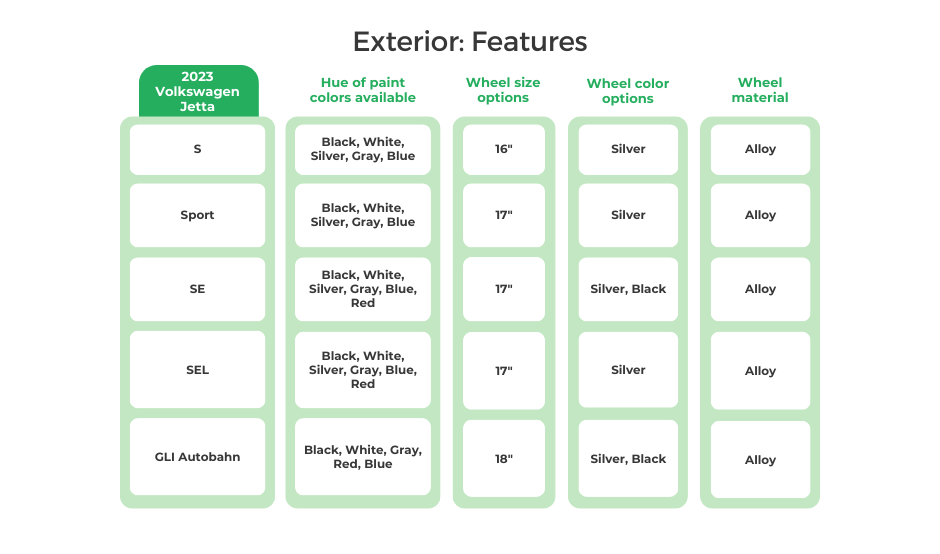
Exterior Dimensions:
A larger interior doesn’t always mean a bigger exterior. In this case, the Jetta is about two inches longer and taller than the Civic sedan. This VW is also about eight inches longer than the Civic hatchback. A few inches here or there won’t matter to most, but the Jetta’s larger size could make for a tighter squeeze in urban settings and smaller garages.
Yet the Jetta’s greater length doesn’t lead to a longer wheelbase. On the contrary, the Civic is two inches longer between the axles. A greater wheelbase often helps smooth out rough roads and lessens the impact of highway expansion strips.
If possible, I’d suggest doing a back-to-back Jetta-Civic test drive over the same streets to see if you notice a difference in ride quality.
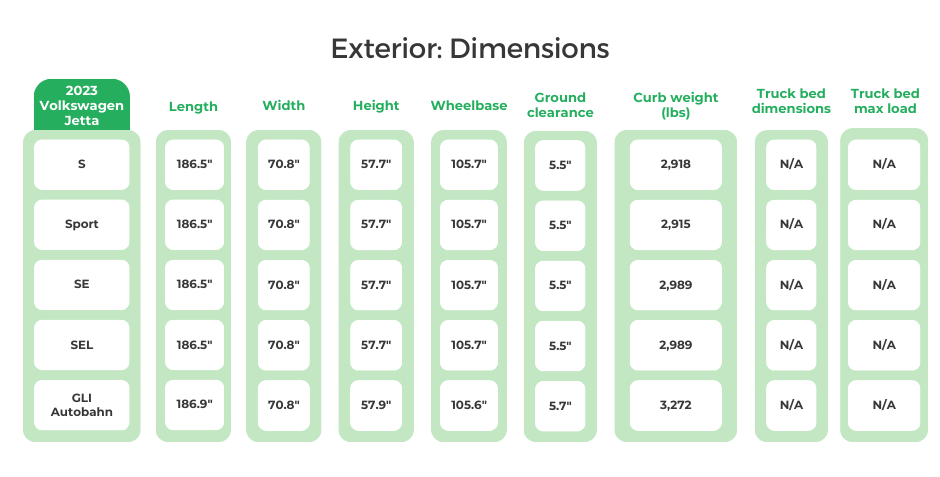
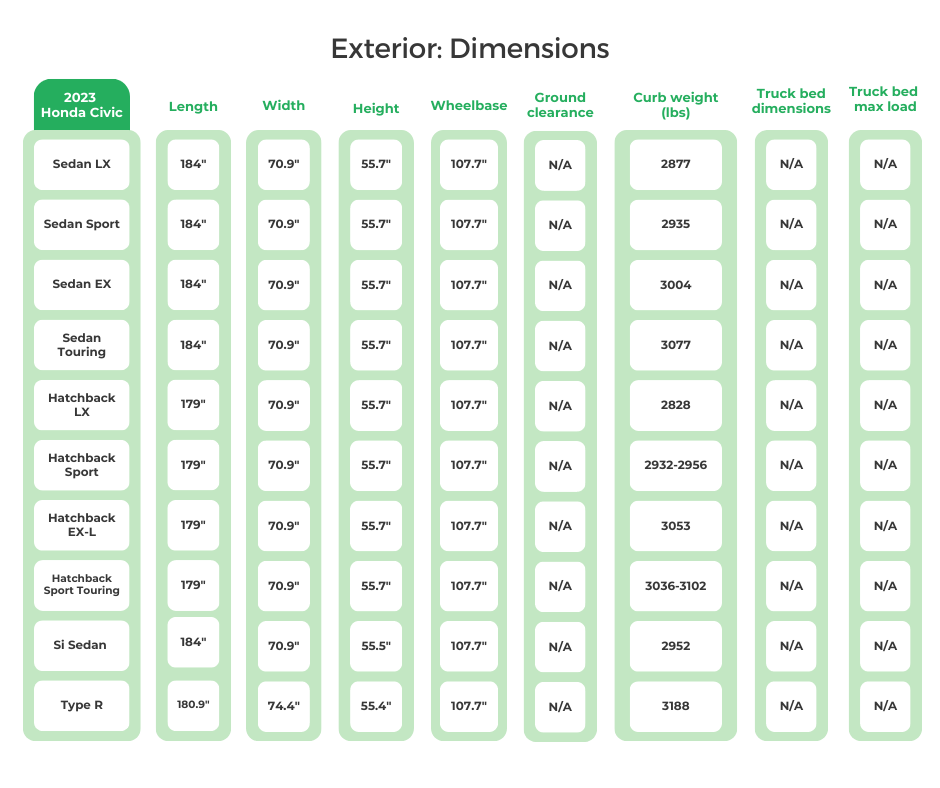
Warranty:
Quick Take: Honda offers a more traditional approach to the Civic’s warranty, while Volkswagen combines coverage into a more comprehensive but shorter package.
Honda’s factory warranty is typical for mainstream brands: three years or 36,000 miles of bumper-to-bumper safeguards and five years or 60,000 miles of powertrain protection. In contrast, like many luxury brands, Volkswagen extends its bumper-to-bumper coverage to four years or 50,000 miles. However, VW doesn’t offer extended-term protection for the powertrain.
In essence, with Volkswagen, you’re betting there won’t be any engine or transmission trouble between years four and five as a trade-off for extra safeguards between years three and four.
Both automakers offer complimentary scheduled maintenance for the first two years, yet VW has a cut-off at 20,000 miles, compared to 24,000 miles for Honda. The 4,000-mile difference isn’t significant, but could matter to an owner who drives more than 800 miles a month.
| 2023 Volkswagen Jetta Factory Warranty Coverage: |
2023 Honda Civic Factory Warranty Coverage: |
|
| Basic warranty: | 48 months/50,000 miles | 36 months/36,000 miles |
| Powertrain warranty: | 48 months/50,000 miles | 60 months/60,000 miles |
| Corrosion perforation warranty: | 84 months/100,000 miles | 60 months/unlimited miles |
| Air conditioning warranty: | 48 months/50,000 miles | 36 months/36,000 miles |
| Battery warranty: | 36 months/36,000 miles | 36 months/36,000 miles |
| Emissions warranty: | Federal: (Defect & Performance) 24 months/24,000 miles – 96 months/80,000 miles California: (Defect & Performance) 36 months/50,000 miles – 72 months/70,000 miles | 36 months/36,000 miles96 months/80,000 miles on some parts |
| Complimentary scheduled maintenance: | 24 months/20,000 miles | 24 months/24,000 miles |
| Roadside assistance coverage: | 36 months/36,000 miles | 36 months/36,000 miles |
| Total unique recalls: | 0 | 1 |
Methodology
- Compare two vehicles, Volkswagen Jetta and the Honda Civic, and provide a comprehensive analysis.
- Gather relevant information and data on both vehicles from reliable sources, such as manufacturer specifications, expert reviews, customer feedback, industry reports, and data sources like manufacturer websites, FIXD App, Kelley Blue Book, FuelEconomy.gov, and NHTSA.
- Collect data on various aspects, including performance, safety features, fuel efficiency, maintenance costs, reliability, owner satisfaction, and market value.
- Identify the key criteria that will be used to evaluate and compare the two vehicles.
- Ensure the criteria cover both objective factors (such as performance metrics, safety ratings, and fuel efficiency) and subjective factors (such as owner satisfaction, comfort, and features).
- Assess the performance of both vehicles based on factors such as acceleration, handling, braking, and overall driving experience.
- Compare engine options, horsepower, torque, transmission options, and any unique performance features.
- Examine the safety features and ratings of both vehicles.
- Evaluate crash test ratings, advanced driver assistance systems (ADAS), active and passive safety features, and any notable recalls or known issues related to safety.
- Consider both NHTSA safety ratings and IIHS awards for a comprehensive safety assessment.
- Analyze the fuel economy of both vehicles based on EPA mileage estimates.
- Compare their MPG ratings, average full-tank range, and any significant differences in fuel efficiency.
- Assess the average annual maintenance and repair costs for both vehicles.
- Consider data from surveyed owners and other reliable sources, such as FIXD App owner surveys, to determine the overall cost of ownership over time.
- Evaluate the reliability of both vehicles based on owner reports, FIXD App data, and any known issues or recalls.
- Consider factors such as engine reliability, common problems by model year, long-term durability, and owner reliability scores gathered from surveys.
- Consider owner satisfaction by gathering information from forums, online communities (Reddit: r/whatcarshouldIbuy), customer reviews, and owner reliability scores.
- Summarize key factors that owners appreciate and any common complaints or drawbacks mentioned by owners.
- Compare the features and technologies offered by both vehicles.
- Highlight any notable differences in terms of infotainment systems, connectivity options, driver assistance features, interior quality, and available upgrades.
- Assess the market value and depreciation of both vehicles.
- Compare average prices, resale value, and how the vehicles hold their value over time.
- Consider average private-seller valuations from Kelley Blue Book (KBB) for a comprehensive assessment.
- Summarize the findings of the comparison, highlighting the positives and negatives of each vehicle.
- Provide a fair and balanced recommendation based on the comparison, considering factors such as budget, personal preferences, specific needs of the buyer, and the comprehensive analysis conducted.
Sources:
- Fuel Economy: Mileage-per-gallon estimates according to the EPA MPG on Fueleconomy.gov.
- Safety Ratings: Crash test data collected and reported by NHTSA, as well as IIHS Award information, were collected for this article.
- Vehicle Prices/Features: Most or all information gathered on vehicle features was from the manufacturer’s website, in this case, vw.com and hondacars.com.

Dave Goldberg is an automotive journalist and lifelong car fanatic. He writes for numerous enthusiast and business outlets and is an ongoing contributor to HotCars.com, one of the most popular car culture websites. When he’s not writing or driving, Dave is either under a hood or asleep. His credentials include a BA in Journalism from The George Washington University.

